Editor’s note: The information for this story includes excerpts from the citations written from materials provided by the Horace H. Rackham School of Graduate Studies, the Office of the Vice President for Research, the Senate Advisory Committee on University Affairs and the University Press.
Twenty-six faculty members are being recognized Thursday for their teaching, scholarship, service and creative activities.
Distinguished University Professorships recognize full or associate professors for exceptional scholarly and/or creative achievement, national and international reputation, and superior teaching skills. Created in 1947, each professorship bears a name determined by the appointive professor in consultation with her or his dean. Each professorship also carries an annual salary supplement of $5,000 and an annual research supplement of $5,000. The duration of the appointment is unlimited, and the title — without the salary and research supplements — may be retained after retirement. In addition, newly appointed Distinguished University Professors are expected to deliver an inaugural lecture during the first year of appointment.
Honorees and their awards are:
• Richard Janko, Gerald F. Else Distinguished University Professor of Classical Studies; professor of classical studies, LSA
• Gordon Kane, Victor F. Weisskopf Distinguished University Professor of Physics and professor of physics, LSA; professor of art and design, School of Art & Design (A&D)
• Miriam Meisler, Myron Levine Distinguished University Professor of Human Genetics, professor of human genetics, Medical School
• Terry E. Robinson, Elliot S. Valenstein Distinguished University Professor of Psychology and Neuroscience, professor of psychology, LSA
Distinguished Faculty Achievement Awards honor senior faculty who consistently have demonstrated outstanding achievements in the areas of scholarly research and/or creative endeavors; teaching and mentoring of students and junior faculty; service; and a variety of other activities. Up to five awards of $1,500 are made each year. Awardees include:
• Paul Berman, professor of physics, LSA
• Christin Carter-Su, professor of molecular and integrative physiology, associate director and chief of the Biomedical Research Division of the Michigan Diabetes Research and Training Center, Medical School
• Richard Gonzalez, professor of psychology, professor of statistics, LSA; research professor, Institute for Social Research (ISR) Center for Human Growth and Development; professor of marketing, Stephen M. Ross School of Business
• Alfred Hero, R. Jamison and Betty Williams Professor of Engineering, professor of electrical engineering and computer science, professor of biomedical engineering, College of Engineering (CoE); professor of statistics, LSA
• Mark Meyerhoff, Philip J. Elving Collegiate Professor of Chemistry, professor of chemistry, LSA
Faculty Recognition Awards are intended for faculty early in their careers who have demonstrated substantive contributions to the university through achievements in scholarly research and/or creative endeavors; excellence as a teacher, adviser and mentor; and distinguished participation in service activities of the university. Eligible candidates include full professors with no more than four years at that rank, associate professors and assistant professors. Up to five awards of $1,000 each are made each year. Recipients include:
• Brian Jacob, Walter H. Annenberg Professor of Education Policy, professor of public policy, director of the Center for Local, State and Urban Policy, Gerald R. Ford School of Public Policy; professor of economics, LSA; professor of education, School of Education
• Ursula Jakob, professor of molecular, cellular and developmental biology, LSA
• Mahta Moghaddam, professor of electrical engineering and computer science, CoE
• Mark Newman, professor of physics, LSA
• Yopie Prins, professor of English and comparative literature, LSA
University Undergraduate Teaching Awards are designed to honor faculty early in their careers who have demonstrated outstanding ability in teaching undergraduate students. Nominees must have an evident commitment to students; a record of innovation in teaching and learning; notable dedication to working effectively with a diverse student body; and a consistently positive effect on students’ intellectual/artistic development. Each year up to two awards of $1,000 will be made. Awardees are:
• Edward Chang, professor of psychology, LSA
• Jamie Phillips, associate professor of electrical engineering and computer science, CoE
University Press Book Awards are presented to members of the university teaching and research staff, including emeritus members, whose books have added the greatest distinction to the Press List. Selections are made from books published within a span of two calendar years. This year’s stipend is $1,500. Awardee:
• Tobin Siebers, Vernon Louis Parrington Collegiate Professor of Literary and Cultural Criticism, professor of English language and literature, LSA; professor of art and design, A&D
The Jackie Lawson Memorial Faculty Governance Award honors those who have displayed exceptional distinction reflected in faculty governance service to the entire university that reaches beyond the local campus confines of Ann Arbor, Dearborn and Flint, and have excelled in building a positive relationship between the Ann Arbor campus and one or both regional campuses. A $1,500 stipend is presented. Awardee:
• M. Robert Fraser, associate director for scholarly resources, Mardigian Library, UM-Dearborn
The Distinguished Faculty Governance Award was established by The Senate Advisory Committee on University Affairs in 1986 and is funded by the Alumni Association. The criterion for the award is distinguished service to faculty governance over several years with an emphasis on universitywide service. A $1,500 stipend is presented. Awardee:
• David Potter, Arthur F. Thurnau Professor of Greek and Latin, Francis W. Kelsey Collegiate Professor of Greek and Roman History, LSA
The Regents Award for Distinguished Public Service recognizes public service activities that relate closely to teaching and research, and reflect professional and academic expertise. The service activities may occur outside the university in local, state, national or international arenas. A $1,000 stipend is presented. Awardee:
• Robert Axelrod, Mary Ann and Charles R. Walgreen, Jr. Professor for the Study of Human Understanding, professor of political science, LSA; and professor of public policy, Ford School
The University Librarian Achievement Award is presented for exceptional distinction reflected in active and innovative career achievements in library, archival or curatorial services. The recipient will receive a $1,500 stipend. Awardee:
• Scott Dennis, senior associate librarian, Harlan Hatcher Graduate Library Reference Department, University Library
The University Librarian Recognition Award honors an individual who holds a primary faculty appointment as librarian, archivist or curator with no more than eight years’ practice in the profession. Selection criteria include active and innovative early career achievements in library, archival or curatorial services. This may include developing specialized services for faculty and students, improving access to information or efficiently managing library and archival resources, or other activities. The recipient is presented $1,000. Awardee:
• Loyd Mbabu, librarian, Harlan Hatcher Graduate Library Reference Department, University Library
The Collegiate Research Professorship Award honors exceptional scholarly achievement and impact on advancing knowledge in science, engineering, health, education, the arts, the humanities or other academic field of study. The recipient is presented $2,000. Awardee:
• Lloyd Johnston, distinguished senior research scientist and research professor, Survey Research Center, ISR
Research Faculty Achievement Awards are given for outstanding scholarly achievements, as represented by significant contributions to an academic field of study over time, a specific outstanding discovery or the development of innovative technology. Nominees must hold at least a 75-percent appointment at the rank of research professor, research associate professor, research scientist or associate research scientist. Recipients receive $1,500 each and are selected by the vice president for research based on the recommendation of the research faculty awards committee. Honoree:
• Johann Borenstein, research professor, Department of Mechanical Engineering, CoE
Research Faculty Recognition Awards honor individuals who hold at least a 75-percent appointment at the rank of research associate professor, research assistant professor, associate research scientist or assistant research scientist. Selection criteria include exceptional scholarly achievements, as evidenced by publications and/or other scholarly activities in any academic field of study. There is a $1,000 stipend. Awardees:
• Keith Cook, research assistant professor, Department of Surgery, Medical School; Department of Biomedical Engineering, CoE
• Robert Cary Welsh, research assistant professor, Department of Psychiatry and Department of Radiology, Medical School.
Distinguished University Professorship, Richard Janko
Richard Janko, one of the foremost scholars of classical Greek, is a noted Homerist, literary papyrologist, and specialist on Aristotle and ancient literary criticism. His research and findings have revolutionized thinking on a range of subjects, from epic poetry to Greek philosophy and religion.

Janko
In “Homer, Hesiod and the Hymns: diachronic development in epic diction” (Cambridge University Press, 1982), the Gerald F. Else Distinguished University Professor of Classical Studies and professor of classical studies, LSA, introduced a new level of statistical sophistication to the study of ancient literature, which has had implications for the history of Homeric poetry.
Following his second book, “Aristotle on Comedy: towards a reconstruction of Poetics II” (G. Duckworth & Co., Ltd, 1982), which brought to light remains of Aristotle’s lost treatise on comedy, Janko published a translation of the philosopher’s “Poetics” (Hackett Publishing Co., 1987). His “The Iliad. A Commentary: Books 13-16” (Cambridge University Press, 1992), is the standard reference consulted internationally. Research on ancient theories of poetry led Janko to Philodemus, an Epicurean poet and philosopher of the first century, whose treatises are preserved in carbonized papyri in Herculaneum. Using mathematics, computers and imaging skills to reassemble papyrus fragments, he revolutionized the methods and standards used to edit damaged and difficult-to-read papyri. The result, Philodemus: “On Poems” Book I (Oxford University Press (2000), won the American Philological Association’s Goodwin Award of Merit and Italy’s Theodor Mommsen Prize. Janko published “On Poems” Books 3-4, with the Fragments of Aristotle’s “On Poets” in 2010. He is working on the third volume, “On Poems” Book 2, in the Oxford University Press series. Janko has authored seven books and more than 100 articles and reviews.
As Department of Classical Studies chair, Janko raised standards for undergraduate teaching and the department’s profile internationally. A fellow of the American Academy of Arts and Sciences and member of the American Philosophical Society, he has earned accolades including the 2011 Henry Russel Lectureship.
Distinguished University Professorship, Gordon Kane
Gordon Kane works in the forefront of theoretical particle physics and cosmology to unravel the mysteries of the universe, including the origin of particle masses and the whereabouts of dark matter. He has developed and extended theories beyond the Standard Model, including substantial contributions to string theory.
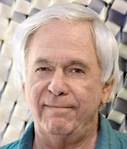
Kane
Kane is the Victor F. Weisskopf Distinguished University Professor of Physics and professor of Physics, LSA; and professor of art and design, A&D. He is one of the leading proponents of supersymmetry, which requires that for each observed particle there be a super-partner, as yet unseen. His models have set the standard for supersymmetry investigations, including experiments at the European Large Hadron Collider.
Kane’s approximately 200 published papers are highly cited and include agenda-setting original work. One review he co-authored, reprinted as “The Higgs Hunter’s Guide” (Perseus Books, 1990), is considered the bible for investigations of the Higgs boson, a particle hypothesized by the Standard Model. Kane has authored or co-authored books including “The Particle Garden: Our Universe as Understood by Particle Physicists” (Helix Books, 1996). His “Supersymmetry: Squarks, Photinos, and the Unraveling of the Ultimate Laws of Nature” (Perseus Books, 2000) is widely read.
Kane teaches a graduate course on the Standard Model to physics students from theoretical and experimental backgrounds and has mentored more than a dozen doctoral students. As director of the Michigan Center for Theoretical Physics, he has brought more than 2,000 visiting scientists to the university for workshops on topics in the forefront of physics.
Kane has served U-M on the Finance Committee and the Budget Priorities Committee, and is a senior fellow of the Michigan Society of Fellows. Previously a Guggenheim Fellow, Kane has been elected a fellow of the American Physical Society, the American Association for the Advancement of Science and the British Institute of Physics. He also advises the Department of Energy and the National Science Foundation.
Distinguished University Professorship, Miriam Meisler
In a career spanning four decades, molecular geneticist Miriam Meisler has launched new areas of basic research, pioneered the use of the mouse for studies of genome function, and contributed to knowledge of the genetics of neurological and neuromuscular diseases.
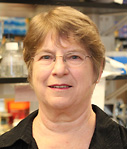
Meisler
As founding president of the International Mammalian Genome Society, Meisler contributed to establishment of policies for the mouse genetics scientific community. In her laboratory research, the Myron Levine Distinguished University Professor of Human Genetics and professor of Human Genetics, Medical School, discovered that mutations in sodium channel genes in mice and humans are a primary cause of inherited epilepsy and other neurological disorders. She has used mouse models to clone additional disease genes, which she then evaluated as candidates for human disorders.
Meisler has published more than 150 research articles in top journals including Nature and Science. She has served on numerous editorial boards and was associate editor of Genomics. She has served as director of the Predoctoral Training Program in Genetics since 2000, and has trained more than 30 graduate students and postdoctoral fellows. Many have gone on to independent academic careers, including three at U-M. Meisler is a strong advocate for women and underrepresented minorities and has been active on the Women and Science Advisory Committee, Minority Undergraduate Mentorship Program, and Medical School Task Force on Diversity and Faculty Development. She also has served as the Medical School’s associate dean for research, as acting chair of the Department of Human Genetics and director of the Center for Genome Research.
Meisler also serves on National Institutes of Health review panels and as a member of the American Society for Human Genetics Program Committee. A fellow of the American Association for the Advancement of Science and a senior fellow in the Michigan Society of Fellows, she has received accolades including the Eleanor Roosevelt Cancer Fellowship. University honors include the Distinguished Faculty Achievement Award, Sarah Goddard Power Award and the Distinguished Faculty Lectureship Award in Biomedical Research.
Distinguished University Professorship, Terry E. Robinson
Terry E. Robinson is known internationally for his research concerning the persistent behavioral and neurobiological consequences of repeated exposure to drugs of abuse, and the implications of these for addiction and relapse. He is considered a leading expert on the psychology and neurobiology of addiction.
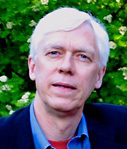
Robinson
Robinson’s early research included seminal papers showing that repeated treatment with potentially addictive drugs produces long-lasting (months to years) changes in subsequent drug-induced behavior, as well as associated alterations in brain chemistry and structure. The Elliot S. Valenstein Distinguished University Professor of Psychology and Neuroscience, and professor of psychology, LSA, also showed that the context in which drugs are experienced strongly influences their ability to change the brain and behavior. He has been supported by both a Senior Scientist award and a MERIT award from the National Institute on Drug Abuse (NIDA). With U-M colleague Kent Berridge, he has published influential theoretical articles on how drug-induced changes in brain and behavior may contribute to the development of addiction. He has published more than 200 articles, which have been cited more than 17,000 times, making him one of the highest-cited scientists in neuroscience.
Dedicated to the education of future scientists, Robinson directs the NIDA Training Program in Neuroscience at the U-M, and has chaired 17 dissertation committees, served on another 28 committees, and has mentored 14 postdoctoral fellows and many more undergraduates. He has served as chair of the biopsychology and neuroscience programs, and on numerous departmental and university committees. Robinson has been recognized with the Neuroscience Program’s Outstanding Faculty Service Recognition Award and the LSA Excellence in Research Award. A fellow of the American Association for the Advancement of Science and of the Association for Psychological Science, Robinson also is a member of the American College of Neuropsychopharmacology and the Society for Neuroscience. He edited the journal Behavioural Brain Research for 13 years.
Recognizing Robinson’s pioneering research, the American Psychological Association recently recognized him with the Donald O. Hebb Distinguished Scientific Contribution Award.
Distinguished Faculty Achievement Award, Paul Berman
An internationally recognized theoretical physicist, Paul Berman explores fundamental problems involving the interaction of light with matter. His theories challenge long-accepted notions, open new avenues of inquiry and sharpen understanding of the physical world.
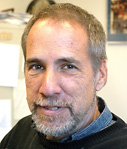
Berman
Berman, professor of physics, LSA, a protege of Nobel Prize winner Willis Lamb, demonstrated his scientific abilities with the publication of his doctoral thesis “Influence of Resonant and Foreign Gas Collisions on Line Shapes” in The Physical Review. He has gone on to publish more than 230 articles and book chapters, including contributions to the Handbook of Optics and the Encyclopedia of Modern Optics. He is editor of “Advances in Atomic, Molecular, and Optical Physics” and the lead author of a new textbook, “Principles of Laser Spectroscopy and Quantum Optics” (Princeton University Press, 2011). Early in his career, Berman pointed out the fallacy of the notion that a quantum theory was needed to model the velocity-changes that occur when atoms undergo collisions that simultaneously produce phase shifts in the atomic wave functions. He was among the first to explore the way in which both steady-state and coherent transient spectroscopy could be used to extract key information on collision processes in vapors. Together with Boris Dubetsky and other coworkers, he developed theories of atom optics and atom interferometry that have implications for precision measurements of fundamental constants, rotation rates and gravitational acceleration. Currently, he is using a microscopic picture of atom-field scattering to explore theories of light propagation, reflection and refraction.
Berman has developed and taught the popular undergraduate courses 20th Century Concepts of Space, Time and Matter; and The Evolution of Scientific Thought. He has mentored 13 doctoral students and seven post-doctoral students. Berman has served on committees including the Physics Department Executive Committee and the LSA Divisional Committee. He is a fellow of the Optical Society of America and American Physical Society, and recently was elected to the American Physical Society’s Division of Laser Science Executive Committee.
Distinguished Faculty Achievement Award, Christin Carter-Su
Christin Carter-Su is recognized internationally for her landmark studies of the structure and function of growth hormone receptors, including her discovery of the role of the signaling molecule JAK2. Her research has impacted the understanding of physiology and has led to insights into cancer, diabetes and growth abnormalities.
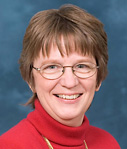
Carter-Su
Carter-Su is a professor of molecular and integrative physiology, and associate director and chief of the Biomedical Research Division of the Michigan Diabetes Research and Training Center, Medical School. Her discovery that growth hormone stimulation of target cells and tissues is associated with the acute activation of tyrosine kinase constituted a paradigm shift in the understanding of growth hormone action and of cytokine receptor signaling. Her laboratory was the first to demonstrate that growth hormone binding to its receptor activates an enzyme that is associated with the receptor. Her group also has dissected a substantial portion of what is known about the intracellular signaling that takes place when the growth hormone receptor is activated.
In her administrative roles, Carter-Su brings together faculty from different disciplines, enhancing their research by providing resources and opportunities to collaborate. She helped revamp the cell physiology course, initiated an interdepartmental signal transduction course, served on 83 dissertation committees and has mentored more than 30 undergraduate students, 12 graduate and medical students, and 16 postdoctoral fellows. Carter-Su received the American Physiological Society’s Bodil Schmidt-Nielsen Distinguished Mentor and Scientist Award in 2004. She reviews grants for organizations including the National Institutes of Health (NIH) and has served in a variety of capacities with the American Diabetes Association, Juvenile Diabetes Foundation, Growth Hormone Research Society and Endocrine Society. She also has served on the editorial boards of Endocrine Reviews, Endocrinology, American Journal of Physiology, Molecular Endocrinology and other journals. Carter-Su’s accolades have included the Endocrine Society’s Roy O. Greep Lecture Award for outstanding contributions to research and an NIH Merit Award. She has received the Faculty Recognition Award, Sarah Goddard Power Award and the Distinguished Faculty Lectureship Award in Biomedical Research.
Distinguished Faculty Achievement Award, Richard Gonzalez
For more than 20 years, Richard Gonzalez has applied statistics and mathematical models to complex, real-world problems, including how people make decisions. His quantitative techniques have resulted in discoveries in psychology, business, design, medicine and neuroscience.
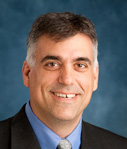
Gonzalez
Gonzalez is a professor of psychology and professor of statistics, LSA; research professor, ISR Center for Human Growth and Development; and professor of marketing, Ross School. His work on the nonlinear weighting of probability combines formal analysis with empirical date. His identification of two components in decision weights: sensitivity to probability and risk attitude, is considered one of the most important developments in prospect theory. Gonzalez’ widely cited research on analytic strategies for interdependent relationships such as married couples and mother-child pairs has improved psychologists’ ability to understand and model these relationships and has made his “Data Analysis for Experimental Design” (Guilford Press, 2009) a classic.
Gonzalez also has investigated cultural differences in consumer choice and has applied choice models to product development and measurement of consumer preferences. His other research interests include developing models of mediation, examining the role of Bayesian statistical models in psychology and developing analytic methods for brain imaging. Four to six graduate students and more than 10 undergraduate students typically work in his lab each semester. He has chaired or served on 51 dissertation committees and has nurtured a generation of researchers, many of whom are leaders in their fields. He co-founded the Design Science doctoral program which has flourished under his leadership as co-director. Gonzalez has published more than 85 book chapters and articles in an array of journals, including Journal of Personality and Social Psychology, Management Science, and Cognitive Psychology. He serves on the Research Center for Group Dynamics Executive Committee and the Institute for Social Research Policy Committee, among others. Gonzalez chaired the Department of Psychology from 2002-07. He has been elected a fellow of the Association for Psychological Science, the American Psychological Association, the Society for Multivariate Experimental Psychology and the Society of Experimental Social Psychology.
Distinguished Faculty Achievement Award, Alfred Hero
An international leader in the theory and practice of signal processing and imaging, Alfred Hero also has made foundational contributions to statistics and information theory. Employing sophisticated models, analyses and algorithms to extract information from data, he has solved practical problems in biology, genomics, cyber security and communications. Hero’s contributions include the analysis and optimization of estimation systems, advances in the use and analysis of the expectation maximization algorithm, and graph theories for estimation.
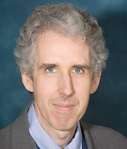
Hero
The R. Jamison and Betty Williams Professor of Engineering, professor of electrical engineering and computer science, professor of biomedical engineering, CoE, and professor of statistics, LSA, identifies the essence of a problem and makes associations between it and an assortment of mathematical and statistical tools available to solve it. Hero demonstrated the use of graph theory methods to address the problem of co-registering two different medical images. Researchers are using his findings to design new instruments to better visualize anatomy and physiology. He has developed image processing methods for image segmentation and indexing, content-based retrieval and character recognition; communication link technology for space-time coding and estimating time of arrival; imaging algorithms for PET and MRI; intelligent vehicular systems that estimate vehicle position using on-board sensors; and bioinformatics and biomedical data processing.
Hero has published more than 110 articles and 300 conference papers, holds two patents and has four patents pending. He has graduated 32 doctoral students; many are leaders in their fields. A fellow and past-president of the Institute of Electrical and Electronic Engineers (IEEE), Hero chairs conferences and committees, sits on the IEEE board of directors and has received the organization’s highest honors — the IEEE Signal Processing Society Meritorious Service Award, Third Millennium Medal and Signal Processing Society Distinguished Lectureship. He also is a member of the American Association for the Advancement of Science. At the CoE, Hero has led faculty searches and served on the Electrical Engineering and Computer Science Executive Committee, College Rules Committee and Department Chair Search Committee.
Distinguished Faculty Achievement Award, Mark Meyerhoff
Internationally recognized chemist Mark Meyerhoff has made path-breaking contributions to the fields of electroanalytical chemistry and biosensors, including the development of several ion-, gas- and bio-selective electrochemical sensors that measure analytes in blood, and of biocompatible polymeric coatings that improve the safety and efficacy of implantable medical devices.
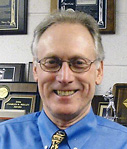
Meyerhoff
Early in his career, the Philip J. Elving Collegiate Professor of Chemistry and professor of chemistry, LSA, worked on ammonia gas-sensing electrodes for trace analysis. Meyerhoff’s research on such potentiometric devices also led to development of catheters and other configurations for monitoring gases and electrolytes in serum and whole blood. Biocompatibility is a challenge for successful implantation of electrochemical devices in humans for in situ monitoring. By understanding interactions between the biological system and the electrochemical implant and modifying the surface of the electrode material, Meyerhoff has created surface treatments that enhance biocompatibility. The university patented several polymeric materials that are capable of slowly releasing nitric oxide gas, which greatly decreases both clotting and growth of bacteria on polymer surfaces. He also invented polyion sensors that can measure heparin levels in human blood.
Meyerhoff has published more than 300 papers in major international journals, including Analytical Chemistry. He has served on the editorial board of almost every major journal in his field and has served as a consultant to such firms as Instrumentation Laboratories, Medtronic, Eli Lilly, Sensicore and Michigan Critical Care Consultants. Meyerhoff has mentored more than 50 doctoral students. He recently created a new undergraduate Biomedical Analytical Chemistry course for pre-health field students. He has served as interim department chair, on the department’s executive committee and Graduate Student Recruiting Committee, Rackham Executive Board, Senate Advisory Committee on University Affairs, and the Presidential Search Committee that led to the appointment of James Duderstadt. A past-president of the Society for Electroanalytical Chemistry, Meyerhoff received the society’s Charles N. Reilley Award and the American Chemical Society Division of Analytical Chemistry Award in Electrochemistry. His accolades include a Faculty Recognition Award, LSA Research Award and Rackham Distinguished Graduate Mentor Award.
Faculty Recognition Award, Brian Jacob
Called a brilliant economist and scholar, Brian Jacob has made important contributions to scientific understanding and policy debates about school choice, education accountability reform, teacher labor markets, and the consequences of other social policies such as housing vouchers. Using knowledge gained as a policy analyst for the New York City mayor’s office and as a teacher in East Harlem, Jacob identifies natural experiments that answer important questions in education and social policy and publishes the results in premiere economic journals.
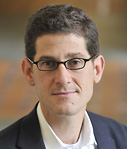
Jacob
The Walter H. Annenberg Professor of Education Policy, professor of public policy, director of the Center for Local, State and Urban Policy (CLOSUP) in the Ford School; professor of economics, LSA; and professor of education, School of Education, is a nationally recognized expert on test-based accountability, which seeks to hold schools and teachers accountable for student success. Jacob’s research includes development of an algorithm to identify teacher cheating in accountability testing, the impact of mandatory summer school and repeating a grade on student achievement, and the effectiveness of school administrators in assessing teachers. Jacob has developed innovative graduate-level courses in education policy. In his practicum course, students recently analyzed future directions for education in Michigan for the Citizens Research Council of Michigan. In another, students use an economic lens to examine the potential impact of popular approaches to education reform. He also is director of CLOSUP, which collects survey responses and regularly disseminates policy briefs that promote best practices.
Jacob serves on the executive committee of the National Poverty Center, on the editorial boards of the American Economic Journal and Education Finance and Policy, and is a research associate for the National Bureau of Economic Research. In 2008 Jacob received the David N. Kershaw Award, presented every two years to persons under age 40 who have made distinguished contributions to the field of public policy.
Faculty Recognition Award, Ursula Jakob
Ursula Jakob is advancing understanding of molecular chaperone function and oxidative stress through her paradigm-shifting research that blends biochemistry and biology. Internationally recognized for her research on oxidative stress, protein folding and molecular chaperone function, Jakob opened a new field with the discovery of Hsp33, a redox-regulated molecular chaperone. Hsp33 is the first of a growing number of proteins found to protect cells under oxidative stress, which has implications for bacterial infections and aging. Jakob’s observations have changed the way scientists think about cellular responses to reactive oxygen species. The professor of molecular, cellular, and developmental biology, LSA, was the first to discover the importance of Hsp33 in making bacteria resistant to hypochlorous acid, the active component of bleach.

Jakob
Working with Medical School colleagues, Jakob developed a visual sensor to report oxidative stress. She recently used the sensor to test the long-standing idea that aging is related to oxidative stress, using the roundworm as a model organism. Jakob’s techniques can be used in nearly all cell types and organisms, giving biologists the ability to detect, monitor and quantify the effects of oxidative and nitrosative stress in living organisms. She has published more than 50 papers in such journals as Cell, Nature and Molecular Cell. She has been interviewed by Nature, Science and Microbe and has been a guest on National Public Radio’s “Science Friday.” Jakob plays a key role in the university’s life science curricula, including co-teaching “Introduction to Biochemistry,” a key course for many different concentrations, and “Microbial Physiology” for advanced undergraduates. Since 2001 Jakob has mentored 12 doctoral students, eight master’s students, eight postdoctoral scholars and 25 undergraduate students in her lab, and has served on more than 20 dissertation committees. Jakob brings strong organizational skills to her service on departmental committees, the University’s Life Science Task Force and the Biomedical Research Council. She also is an ad hoc reviewer for several journals, as well as the National Science Foundation and the National Institutes of Health review panels.
Faculty Recognition Award, Mahta Moghaddam
Internationally recognized remote sensing expert Mahta Moghaddam (no photo) uses engineering tools and theories grounded in mathematics and physics to create novel imaging systems for near and remote sensing, from physics-based medical imaging to fight cancer to low-frequency radar instruments and algorithms that measure Earth’s soil moisture under vegetation canopies from platforms high in space. Her discoveries are filling a knowledge gap in climate change research. The professor of electrical engineering and computer science, CoE, is the principal investigator of the $26 million 2010-15 NASA Earth Venture Airborne Microwave Observatory of Subcanopy and Subsurface Mission to design, deploy and fly a radar imaging system that will map major North American biomes. In the area of medical imaging, Moghaddam’s research group has developed algorithms and measurement methodologies for high-resolution detection of cancerous tumors using microwave techniques, and is developing a combined microwave and ultrasound system to ablate cancerous tumors without surgery.
Moghaddam’s student evaluation scores are among the highest in her department. She has guided four students through their doctorates and currently is supervising 10 doctoral candidates, including one who won the Canadian Journal of Remote Sensing 2009 Best Paper of the Year Award. She also has mentored a large and diverse group of undergraduate students. Moghaddam is a member of the Rackham Graduate School Mentoring Others in Excellence Committee and regularly contributes to best mentoring practices workshops in the fields of science, technology, engineering and mathematics. She has served on numerous departmental, CoE and university committees and is a member of the NASA Advisory Council Earth Science Subcommittee, the Institute of Electrical and Electronics Engineers (IEEE) Geoscience and Remote Sensing Society Administrative Committee, and is associate editor of the IEEE Transactions on Geoscience and Remote Sensing. Elected an IEEE Fellow in 2008, Moghaddam received the CoE Education Excellence Award in 2009 and the Electrical Engineering and Computer Science Outstanding Achievement Award in 2010.
Faculty Recognition Award, Mark Newman
Mark Newman is a pioneer in modern network theory. The professor of physics, LSA, was among the first to apply ideas from theoretical physics, scientific computation and mathematics to the analysis of real-world networks, helping to create the foundation for the field of network research and breakthroughs in complex systems.
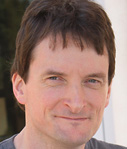
Newman
His innovations include theoretical treatment of homophily, a bias in favor of connections between network nodes with similar characteristics. Newman also popularized the idea of community structure in networks and introduced the most widely used numerical method for detecting community structure, the modularity maximization method. He contributed to the theory of epidemiological spreading on networks and has worked with epidemiologists to understand and control disease, including HIV and Severe Acute Respiratory Syndrome. With U-M colleague Robert Ziff, Newman invented the Newman-Ziff algorithm for studying percolation models. And a method he developed for generating “cartograms” — maps that make use of rescaled countries, states or regions to visually convey quantitative geographic data — provided the foundation for his book “The Atlas of the Real World” (Thames & Hudson, 2008). Newman also has authored or co-authored the books “Networks: An Introduction” (Oxford University Press, 2010), “The Structure and Dynamics of Networks” (Princeton University Press, 2006), among others. He has published more than 100 papers in top journals, and The Economist, Scientific American, The Washington Post, Vanity Fair and National Public Radio all have reported on his work.
Newman is known for guiding students to their own understanding of difficult materials. He revitalized the undergraduate course Statistical and Thermal Physics and developed Network Theory, a graduate course that has contributed significantly to U-M’s leadership in the area. In addition to serving on Department of Physics committees, Newman has worked on two LSA initiatives: a statistical evaluation of undergraduate course enrollment patterns and development of online tools to provide faculty feedback on enrollment and student performance. A fellow of the American Physical Society and member of the Santa Fe Institute’s governing science board, he was named the Santa Fe Institute Ulam Distinguished Lecturer in 2010.
Faculty Recognition Award, Yopie Prins
One of the foremost authorities on Victorian poetry and English Hellenism, Yopie Prins has made signal contributions to subjects including comparative literature, classical reception studies, translation studies, gender studies, lyric theory and historical poetics.

Prins
In “Victorian Sappho” (Princeton University Press, 1999), she paired her reading of Sapphic fragments in original Greek with 19th century translations and imitations of Sappho as a lyric figure. For enhancing the understanding of Victorian poetics and the history of lyric, the professor of English and comparative literature, LSA, was awarded the Sonia Rudikoff Prize for First Book in Victorian Studies, and honorable mention for the Modern Language Association First Book Prize. As a Guggenheim Fellow, she pursued extensive archival research for her second book, “Ladies’ Greek” (to be published by Princeton University Press in 2012), which analyzes translations of Greek tragedy by women in Victorian England and America. She has published a series of essays on meter and music in Victorian poetry, which will be collected in a third monograph, “Voice Inverse.” She is co-editor of “Dwelling in Possibility: Women Poets and Critics on Poetry” (Cornell University Press, 1997) and “The Lyric Theory Reader” (forthcoming from Johns Hopkins University Press).
Prins has served on more than 40 doctoral committees and directed 14 dissertations in English and in comparative literature. She excels in creating fruitful intellectual communities at the university, including the Nineteenth Century Forum, which provides graduate students access to the broader field of Victorian studies, and the Poetry and Poetics Workshop in the English Department. She is a founding member of Contexts for Classics, an interdepartmental faculty consortium that coordinates events across campus and is part of the International Classical Reception Studies Network. In addition to chairing the Department of Comparative Literature for five years, Prins has served on the executive committee and the graduate admissions committee, among others. A senior fellow in the Michigan Society of Fellows, Prins has earned accolades including the LSA Class of 1929 Distinguished Teaching Award in 1998 and the university’s Henry Russel Award in 2002.
University Undergraduate Teaching Award, Edward Chang
Known for his engaging, rigorous lectures, Edward Chang challenges students to think critically, expand their understanding of human behavior and thoughtfully consider their own place in the global community. Students describe the professor of psychology, LSA, as an innovative, caring and hard-working teacher and mentor. He uses music, art, literature, philosophy and documentaries to illustrate or underscore important ideas and concepts.

Chang
In his Introduction to Psychopathology course, Chang, professor of psychology, LSA, encourages students in a class of more than 200 to behave as if it were a small seminar, where they respectfully exchange ideas. Students burrow deeply into scientific methods, practices and writing in his advanced undergraduate courses Introduction to Behavior Therapy and Advanced Laboratory in Psychopathology. In all his classes, Chang instills a healthy skepticism about popular research theories and findings by discussing competing scientific perspectives and interpretations. Diversity is a central tenet of Chang’s research. He also addresses cultural variances in his teaching. He points to how culture and race may impact our understanding of the presentation, course and treatment of illnesses. As a faculty associate in Asian/Pacific Islander American Studies, Chang has advanced a nuanced understanding of human behavior from an Eastern perspective.
He creates a comfortable environment for the more than 20 undergraduates who work in his laboratory each year, and regularly mentors four or more students laboring on honors theses. He empowers student researchers to excel as investigators, and seeks to facilitate their ability to present at scientific conferences, publish in peer-refereed journals, co-author book chapters, and join professional organizations. The Undergraduate Research Opportunity Program acknowledged his outstanding mentoring in 2003 and 2009, and LSA recognized him with an Excellence in Education Award in 2008. Chang has produced more than 100 publications and seven edited books to date. He serves on several editorial boards and is an associate editor of Cognitive Therapy and Research, Journal of Personality and Social Psychology, and the Asian American Journal of Psychology.
University Undergraduate Teaching Award, Jamie Phillips
Students and faculty colleagues praise Jamie Phillips for his logical and clear lectures, numerous curricular innovations, and pedagogical research. The associate professor of electrical engineering and computer science, CoE, transformed a semiconductor course by asking students to role-play the movement of electrons so they could better grasp the workings of semiconductors. He improved an introductory electric circuits course by adding real-world examples, in-class demonstrations and interactive projects. He also introduced a photovoltaics and solar-powered systems section to an entry-level engineering course, giving students the opportunity to design, build and test a solar-powered model car and their own solar-powered product.
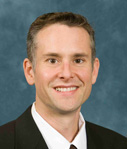
Phillips
Phillips’ teaching is outstanding, as measured by course evaluations and student feedback. He also is improving engineering education through his own research and mentorship of graduate student instructors. In one experiment, he supervised a teaching intern who shared in all aspects of course preparation, from syllabus creation to exams and grading. They presented their results at the American Society for Engineering Education Symposium in 2005. Working with another graduate student, Phillips worked to improve student performance in a semiconductor course by requiring students to complete assigned readings and take quizzes immediately before class. Phillips and his assistant assessed the effectiveness of the just-in-time learning with surveys, comparisons of exam and homework performances, and focus groups. Phillips has advised more than 15 undergraduate research projects, several of which resulted in published journal articles. Students learn research methods and how to think creatively, develop hypotheses and design experiments, and present their results.
As president of the Electrical Engineering and Computer Science (EECS) Alumni Society, Phillips initiated the society’s recruitment of alumni mentors. He advised the Institute of Electrical and Electronic Engineers U-M student chapter and encourages students to support technology-oriented organizations, including Girls in Electrical Engineering and Computer Science. Phillips has been honored with the National Science Foundation CAREER Award, the EECS Department Outstanding Achievement Award and the Defense Advanced Research Projects Agency/Microsystems Technology Office’s Young Faculty Award.
University of Michigan Press Book Award, Tobin Siebers
In “Disability Aesthetics” (University of Michigan Press, 2010), author and critic Tobin Siebers challenges long-held presuppositions in aesthetics and provides a resource for numerous fields of investigation, including visual art, cultural studies, literary studies, media studies and sociology. He writes about the representation of disability in modern art, theorizing that the disabled body and mind have played significant roles in the evolution of aesthetics. Selected the Choice Outstanding Academic Title by the Association of College and Research Librarians, the book forcefully posits disability as a critical framework that questions presuppositions underlying definitions of aesthetic production and appreciation. National Socialism’s role in perceiving the connection between modern art and disability, and the use of aesthetics to justify the oppression of disabled people, are among the topics Siebers explores.

Siebers
The Vernon Louis Parrington Collegiate Professor of Literary and Cultural Criticism and professor of English language and literature, LSA; and professor of art and design, A&D, has authored 38 journal articles and 10 books. They include “Disability Theory” (U-M Press, 2008), winner of the 2009 U-M Press Award. His memoir “Among Men” (University of Nebraska Press, 1999) was nominated for the American Book Award, among others. “My Withered Limb,” published in Michigan Quarterly Review in 1998, was nominated for a Pushcart Prize, and his “Morals and Stories” (Columbia University Press, 1992) was nominated for the Aldo and Jeanne Scaglione Prize for Comparative Literary Studies. Siebers’ other critically acclaimed books include “The Mirror of Medusa” (University of California, 1983) and “Cold War Criticism and the Politics of Skepticism” (Oxford University Press, 1993). Siebers, who serves on the editorial boards of several major journals, chairs the University Initiative on Disability Studies and serves on the U-M’s National Center on Institutional Diversity Steering Committee. He has received the James T. Neubacher Award, Michigan Humanities Award, Distinguished Faculty Achievement Award and LSA Excellence in Research Award (twice). He also is a fellow of the Michigan Society of Fellows and the John Simon Memorial Guggenheim Foundation.
Jackie Lawson Memorial Faculty Governance Award, M. Robert Fraser
M. Robert Fraser has worked to integrate Dearborn faculty with the university’s faculty governance structure and to strengthen faculty governance more broadly. Since his election to the UM-Dearborn Faculty Senate in 2002, he has promoted faculty governance on all three campuses, most recently as interim secretary of the University Senate and the Senate Advisory Committee on University Affairs (SACUA).
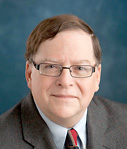
Fraser
Fraser was a member of the UM-Dearborn Faculty Senate and its executive council for three years. The associate director for scholarly resources, Mardigian Library, chaired UM-Dearborn’s Academic Integrity Task Force, the Benefits Committee (for which he drafted the inaugural charge and served as the founding chair) and the Information Technology Advisory Committee. He was central in implementing structural changes in the academic integrity policies and procedures at the Dearborn campus.
Fraser’s Dearborn colleagues elected him to the University Senate Assembly in 2005. He served six years on the Senate Assembly and was elected to a three-year term on SACUA in 2006. He served as the vice chair of Senate Assembly and SACUA for one year, prior to being named interim secretary in 2009-10. Fraser served as a faculty grievance monitor and as a member of the advisory committees to the secretary of the university and to the Office of the General Counsel. He helped secure Faculty Senate membership for librarians of all ranks. Fraser was a member of the Civil Liberties Board and the University Copyright Policy Revision Committee and chaired the University Faculty Senate Rules Committee and the Faculty Perspectives Editorial Board. He contributed significantly to discussions regarding the university’s budget and compensation as a member of the Budget Study Committee and the Committee on the Economic Status of the Faculty, on which he served as associate chair for faculty benefits issues. Fraser last year chaired the University Administration Evaluation Committee, which improved and streamlined its practices under his leadership.
Distinguished Faculty Governance Award, David Potter
David Potter has demonstrated an ability to get to the heart of problems, bringing perspective and prescience to faculty governance, the Senate Assembly and the Senate Advisory Committee on University Affairs (SACUA), most recently as chair and vice chair in 2008-09 and 2007-08, respectively. Potter promotes power sharing and effective faculty governance by valuing the contributions of others and building consensus. His accomplishments include helping reform university grievance procedures and strengthening SACUA’s role in administrative deliberations in the areas of tenure, joint faculty appointments and the budget.
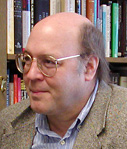
Potter
As chair of the Student Relations Advisory Committee, Potter’s academic leadership and counsel have been valuable to the governance of student life at Michigan. As a member of the Vice President and Secretary of the University Advisory Committee, he is spearheading a review of university policy regarding bullying. The Arthur F. Thurnau Professor of Greek and Latin, and Francis W. Kelsey Collegiate Professor of Greek and Roman History, LSA, has served on numerous Department of Classical Studies committees as well as the Rackham Faculty Research Grants Committee, LSA Curriculum Committee and LSA Dean’s Council on Advising. He also directed the Lloyd Hall Scholars Program. Potter’s contributions are diverse and widespread as demonstrated by his service on the Provost’s Budget Study Committee, Academic Affairs Advisory Committee, Recreational Sports Committee, Advisory Board on Intercollegiate Athletics, and others.
A noted scholar of Roman imperial history, Potter’s undergraduate courses on Roman sports and everyday life are among the university’s most popular. He has directed 37 dissertations and has served on more than 30 dissertation committees. Potter has edited three books and written seven. He wrote a weekly column on ancient and modern sport for the Chicago Tribune’s RedEye and is a frequent contributor to The Financial Times and the History Channel. A member of the American Philological Association and the Society for the Promotion of Roman Studies, Potter received the Faculty Recognition Award in 1991, the LSA Teaching Award in 1992 and 1995, and the John H. D’Arms Award for Graduate Supervision in the Humanities in 2005.
Regents Award for Distinguished Public Service, Robert Axelrod
Robert Axelrod’s theoretical and applied work on conflict, evolution of cooperation and the management of complexity has contributed to the development of understanding between people and provided a fresh perspective on the causes and prevention of war.
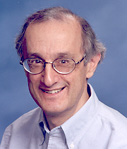
Axelrod
Axelrod is the Mary Ann and Charles R. Walgreen, Jr. Professor for the Study of Human Understanding, and professor of political science, LSA; and professor of public policy, Ford School. Combining game theory, particularly the prisoner’s dilemma, and theories of evolution, he has shown that cooperative arrangements can evolve. His “The Evolution of Cooperation” (Basic Books, 1984), has been published in 12 languages and received positive reviews in scholarly journals, The New York Times and The Wall Street Journal. His research findings regularly inform the actions of the United Nations, World Bank, U.S. Department of Defense and others, and he has advised parties to the Middle East peace process and officials combating terrorism. Axelrod’s “Harnessing Complexity: Organizational Implications of a Scientific Frontier” (Free Press, 2000), co-authored with Michael Cohen, provides policymakers and business leaders a guide to complexity theory and its practical application. Axelrod has authored or edited seven books and more than 70 papers in publications such as American Economic Review, American Political Science Review, and Nature and Science. He and co-author William Hamilton won the Newcomb Cleveland Prize for the most outstanding paper in Science in 1981.
Axelrod has received the National Academy of Sciences (NAS) Award for Behavioral Research Relevant to the Prevention of Nuclear War. He is a longtime member of the Council on Foreign Affairs, past-president of the American Political Science Association, a MacArthur Prize Fellow, and a member of the NAS, the American Academy of Arts and Sciences and the American Philosophical Society. Axelrod has received the U-M Distinguished Faculty Achievement Award, the Henry Russel Lectureship and an honorary degree from Georgetown University.
University Librarian Achievement Award, Scott Dennis
Humanities Librarian and Core Electronic Resources Coordinator Scott Dennis is a driving force behind University Library efforts to make electronic resources available to the campus community. Faculty members, students and other librarians extol his learner-centered approach to reference services and his knowledge of the technical, commercial, social and pedagogical processes and tools in the changing digital environment. The senior associate librarian, Harlan Hatcher Graduate Library Reference Department, University Library, plays a critical role in conceiving, creating and evaluating tools and services patrons need to access the library’s digital collections. They include Mirlyn, MGet It, online journals and databases lists, subject browse categories, and ArticlesPlus, a new discovery service for articles and online content.
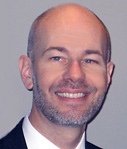
Dennis
Dennis selects and manages the reference materials housed at the Graduate Library’s Information and Reference Center and the Reference Reading Room. As library liaison to the Department of Philosophy, he also purchases materials that support the department’s research, and pilots the librarian role in CTools, which allows him to respond to class discussions in real time. Dennis contributed significantly to the launch of Philosophers’ Imprint, a peer-reviewed, open access electronic journal created by university faculty members and distributed by the library’s Scholarly Publishing Office. Dennis negotiates with vendors for effective interface design, fair cost models and enduring access. His efforts have saved money and ensured that digital content is delivered in a way that advances scholarly use. Dennis involves School of Information students in his projects and mentors colleagues on all three campuses. As the library’s liaison to the Alumni Association, he has helped make electronic resources available to association members.
Dennis is a member of the Association of College and Research Libraries, the American Library Association, and its Gay, Lesbian, Bisexual and Transgendered Round Table and Intellectual Freedom Round Table. A member of the university’s Lesbian, Gay, Bisexual Faculty Alliance, he has received both the Library Diversity Award and the Lavender Information and Library Association Award.
University Librarian Recognition Award, Loyd Mbabu
Through leadership and innovation, Loyd Mbabu is expanding knowledge of the cultural traditions of Sub-Saharan Africa, promoting information literacy, and educating a new generation of skilled library and information science professionals. As the University Library’s subject specialist in African studies, Mbabu develops its African and African diaspora holdings, print and digital, and promotes the library’s resources. The librarian in the Harlan Hatcher Graduate Library Reference Department, University Library, also is an expert on information literacy and an innovator in the information field.
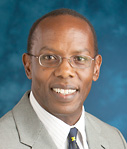
Mbabu
Mbabu’s dedication, enthusiasm and ability to collaborate with faculty members and engage students have encouraged many to successfully explore topics related to African culture, history and politics. He is an integral part of the university’s Center for Afroamerican and African Studies (CAAS) and new African Studies Center. Mbabu developed and taught a popular yearlong course in elementary Swahili that provided knowledge of Swahili morphology and syntax, functional vocabulary, practice in speaking and writing, and an understanding of East African cultures. Building on his doctoral research on the evolution of information literacy skills, Mbabu designed and taught the first-of-its-kind course in the School of Information to educate librarians in the theory and pedagogy of the critical thinking skills and information literacy needs of undergraduates. He also provided an analysis of the curriculum needs of library and information science students in an article in the Journal of Education for Library and Information Science. Mbabu helps faculty explore new scholarly publishing models, including U-M’s online institutional repository Deep Blue. He chaired the library’s award-winning Instructor College and was a member of its Instruction Steering Committee and the Librarians Forum Board.
Mbabu is active in the American Library Association and other professional organizations, and has led the university’s participation in the Cooperative Africana Microfilm Project, an initiative of research librarians worldwide and the Center for Research Libraries to promote preservation of publications and archives of nations of Sub-Saharan Africa. He also has contributed to university efforts to foster economic development, research and educational partnerships with higher education institutions in Africa.
Collegiate Research Professorship Award, Lloyd Johnston
One of the nation’s premier social scientists and experts in adolescent health, Lloyd Johnston has devoted his career to the developmental epidemiology of substance use and related behaviors. Johnston’s Monitoring the Future: A Continuing Study of the Lifestyles and Values of American Youth (MTF) and the Youth, Education and Society (YES) study provide trustworthy and insightful information to educators, scientists and policy makers, including United States presidents and Congress.
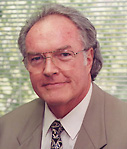
Johnston
MTF, now in its 36th year, was co-founded by Jerald Bachman and Johnston, distinguished senior research scientist and research professor, Survey Research Center, ISR. It focuses on American teens in grades eight, 10 and 12 and college students; and regarded as the gold standard of youth surveys. MTF reports levels and trends, from use of cigarettes, alcohol and illicit drugs to risk behaviors for HIV. Johnston and his colleagues have called early attention to emerging and receding trends. They also have demonstrated the role of perceived risk and perceived social disapproval on teens’ decisions and behavior, which has helped to forewarn of coming changes and to guide the nation’s drug prevention strategy. The landmark YES study, launched 14 years ago, focuses on the effects of policies and other environmental factors on tobacco, alcohol and illicit drug use, dietary behavior, exercise and obesity among American adolescents. MTF and YES have enhanced U-M’s reputation as a leading research university.
Johnston has published and consulted widely, given numerous lectures, and long served on a variety of government and nonprofit sector committees and boards, including presidential appointments to the National Commission on Drug Free Schools and the White House Conference for a Drug-Free America. Johnston was influential in the launching of studies similar to MTF in some 40 other countries. His drive, personality, helpfulness and precision have influenced generations of researchers, policy makers and practitioners. Johnston has displayed interest in developing new scientists and assisting colleagues with their work. Among the honors he has received are the U-M Distinguished Research Scientist Award and the Regents’ Award for Distinguished Public Service.
Research Faculty Achievement Award, Johann Borenstein
Johann Borenstein, head of the university’s Mobile Robotics Laboratory, is known for his contributions to mobile robotics — including advances in obstacle avoidance and position estimation — and for his ability to conceive of and develop novel ways for robots to perform useful functions. A research professor in the Department of Mechanical Engineering, CoE, he began revolutionizing the field in the late 1980s with development of the Vector Field Histogram (VFH), an obstacle avoidance system that allows robots to move among people and objects without bumping into them. His VFH research, featured on CNN and in Popular Science, resulted in some of the most-cited works in mobile robotics. Borenstein has published 41 journal papers and the book “Navigating Mobile Robots: Systems and Techniques” (A.K. Peter, Ltd., 1996).
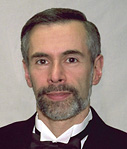
Borenstein
He has developed innovative assistive devices for people with disabilities and tools for navigating hazardous environments. They include NavChair, an obstacle-avoiding power wheelchair for quadriplegics; the Navbelt, which uses audio signals to guide blind users around obstacles; and the Guidecane, a robotic guide dog that uses tactile feedback technology to guide the blind. It won a Discover Magazine Award for technological innovation in 1998. Borenstein introduces students to the thrill of mobile robotics by involving them in his work. He holds 10 patents and has two patents pending. One of his technical achievements is the OmniTread serpentine robot. With tracks on all sides of the robot and pneumatic joints that link its five segments, it can move over tough terrain and navigate through collapsed buildings searching for survivors. Borenstein’s Personal Dead-Reckoning system uses sensors embedded in the heel of a boot to track the position of firefighters and soldiers walking inside buildings where the global positioning system is unavailable. Another invention, Borenstein’s Robust Leader-Follower System, tracks the position of a human leader and transmits a live “breadcrumb trail” to a robotic follower. Borenstein has received numerous awards, including the University Research Scientist Award and the CoE Outstanding Research Scientist Award.
Research Faculty Recognition Award, Keith Cook
Bioengineer Keith Cook (no photo) is internationally recognized for his advances in the field of artificial lungs and other methods of cardiopulmonary support. His work in the Extracorporeal Life Support Research Laboratory addresses urgent health issues associated with end-stage organ diseases. More than 110,000 patients were waiting for transplantable organs in January 2011. As an alternative therapy for end-stage organ disease, artificial organs would improve the lives of patients.
Working seamlessly across disciplines with clinicians, biomedical engineers, radiologists and cardiologists, Cook, research assistant professor in the Department of Surgery, Medical School, and Department of Biomedical Engineering, CoE, has made major contributions in the development of artificial gas exchange devices, cardiopulmonary support devices, the use of extracorporeal life support to resuscitate organs from donors whose hearts are not beating, and development of an artificial placenta for the support of premature infants. He is principal investigator of a major National Institutes of Health grant to develop a thoracic artificial lung, and his research has provided the foundation for an implantable artificial lung, which is being used in several centers in the world. Cook makes complex subjects understandable and engages students in his research. He currently mentors four doctoral candidates in bioengineering and is the primary mentor for approximately 40 undergraduate students who work in his laboratory each year.
Cook has published more than 80 papers, abstracts and book chapters in the fields of artificial organs, cardiac physiology and fluid mechanics. A member of the editorial board of the Journal of the American Society of Artificial Internal Organs and the publication’s section editor for respiratory support, he has received numerous awards from the American Society for Artificial Internal Organs, including its Medforte Innovation Fellowship in 2007 and Young Investigator Award in 2003. Cook has served on the Team Science Taskforce, which rewrote promotion guidelines for Medical School faculty who work on multidisciplinary teams. He also is a member of the Cardiovascular Center and the University Committee for the Use and Care of Animals.
Research Faculty Recognition Award, Robert Cary Welsh
An expert in human neuroimaging, Robert Cary Welsh uses advanced radiological techniques, including functional magnetic resonance imaging (fMRI) and diffusion tensor imaging (DTI), to improve understanding of the human body and disease. Building on his training in high-energy physics, the research assistant professor, Department of Psychiatry and Department of Radiology, Medical School, helped set up several neuroimaging labs on campus, including the Psychiatric Affective Neuroimaging Laboratory and the University’s fMRI center. Welsh recently was appointed associate director of the Veterans Administration fMRI Laboratory.

Welsh
Welsh is an expert in DTI, used to map and measure the integrity and quality of white matter in the brain. His work has led to better understanding of fibromyalgia, lupus, amyotrophic lateral sclerosis (ALS) and several psychiatric disorders. He developed ways to use fMRI to help neurosurgeons identify and avoid destroying vital brain areas during surgery. Welsh also has developed novel techniques to measure connectivity between brain regions, to better understand patients with diseases such as ALS and schizophrenia, and children with obsessive-compulsive disorder. He directs a study to investigate brain changes in individuals with ALS. Funded by the National Institute for Neurological Disorders and Stroke, its goal is to better understand the natural history of the disease and its effect on the brain regions as the disease progresses. He is laying the groundwork for a brain-computer interface that may extend the ability of ALS patients to physically interact with their environment.
Welsh has co-authored publications with more than 20 principal investigators in the past five years and serves as co-investigator on 10 major research grants. He is active in the American Physical Society, the International Society of Magnetic Resonance in Medicine and the Organization of Human Brain Mapping. Welsh also shares his expertise on dissertation committees and by working with large numbers of graduate students, residents, postdoctoral fellows and Undergraduate Research Opportunity Program students. Welsh co-facilitates the biomedical engineering course Special Topics in Functional MRI. He also lectures in the U-M’s summer fMRI course and volunteers in Ann Arbor schools.

